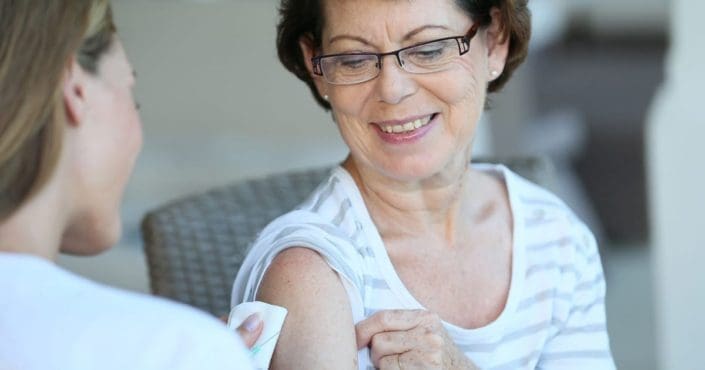
What is a pneumococcal vaccine?
A pneumococcal vaccine is an injected medicine that can protect against and often prevent pneumococcal disease. Pneumococcal disease is caused by a bacterial infection from streptococcus pneumoniae, or pneumococcus. Anyone at any age can get this type of infection. It can cause simple infections, including ear and sinus infections, to more serious infections, such as pneumonia and bloodstream infections. It also can cause tooth or urinary tract infection (UTI).
Older adults are at higher risk for pneumococcal disease. The infection can cause serious illness and even death.
Currently, there are multiple vaccine varieties available to protect against pneumococcal disease. They are classified as conjugate vaccines and polysaccharide vaccines. Two, newer conjugate vaccines are slowly replacing all other varieties.
The recommendation for who should get pneumococcal vaccines continues to be by age, risk level, and the timing of the doses. Although pneumococcal vaccines can protect against pneumococcal disease, they cannot prevent all cases.
Vaccine types
Two newer versions of the pneumococcal vaccine have replaced older versions and cover more strains of the infection. PCV20 (conjugate) and PCV15 (conjugate) are recommended. The numbers represent the number of bacterial strains they protect against.
The older vaccines are PCV13 (conjugate) and PPSV23 (polysaccharide).
PCV15 or PCV20 is recommended for adults 65 years or older and adults 19 through 64 years old with certain medical conditions or risk factors.
What is PCV15?
This conjugate vaccine protects against 15 different types of bacteria that cause pneumococcal disease. It is recommended for children younger than age 5 and children between age 5 through 18 years of age with certain medical conditions. It should be avoided for anyone who has had an allergic reaction to any PCV vaccine.
Your family physician may decide to give you PCV15 if you are aged 65 and older or if you are aged 19-64 with certain medical conditions such as an immunocompromising condition, a cerebrospinal fluid leak, or a cochlear implant. If PCV15 is used, talk to your doctor about getting a dose of PPSV23 at a later date.
What is PCV20?
This conjugate vaccine that protects against 20 different types of bacteria that cause pneumococcal disease. It is recommended for adults 65 and adults 19 through 64 years of age who have certain medical conditions or risk factors. Talk to your doctor about which is right for you, or if you have received an older version of the PCV vaccine.
PCV20 has been shown to offer greater immune response.
Path to improved health
Pneumococcal vaccines can protect you against getting pneumonia, which is contagious and spreads from close, person-to-person contact. Pneumonia is an infection of the lungs and can lead to many symptoms, including:
- Cough
- Fever
- Difficulty breathing
- Chills
- Chest pains
- Bringing up mucus when you cough
For seniors, pneumonia can be very serious and life-threatening. This is especially true if you have a chronic condition, such as diabetes or COPD. Pneumonia can also develop after you’ve had a case of the flu or a respiratory virus such as COVID-19. It is extremely important to stay current on flu shots each year in addition to your pneumococcal vaccines.
Although the older PPSV23 (polysaccharide) and PCV13 (conjugate) vaccines do not protect against all types of pneumonia, they can make it less likely that you will experience severe—and possibly life-threatening—complications from the illness.
The American Academy of Family Physicians recommends that seniors who have not had either pneumococcal vaccine should either get a single dose of PCV 20 or a dose of PCV 15 followed by a dose of PPSV23 6-12 months later. The vaccines cannot be given at the same time.
Things to consider
It is important to talk with your family physician before getting any vaccine. Tell your doctor if you have had an allergic reaction to vaccines in the past or if you have any severe allergies. You should also tell them if you are feeling sick. People with minor illnesses, such as a cold, can still be vaccinated. But if you are moderately or severely ill, your doctor may want you to wait until you feel better before getting a vaccine.
It is possible to have a reaction to a vaccine. If you experience any of the following symptoms after receiving either vaccine, make sure to let your doctor know.
- Redness, swelling, or pain at the injection site
- Loss of appetite
- Fever
- Loss of energy
- Headache
- Chills
- Irritability
If you see signs of a severe allergic reaction after you leave your doctor’s office, call 911 and go to the hospital immediately.
Questions to ask your doctor
- Which pneumococcal vaccine should I get if I have not received any of them?
- Do I need the newer version of the pneumococcal vaccine if I got the older ones?
- When should I make an appointment to get each type of pneumococcal vaccine?
- Should I still get the vaccines if I’ve recently had pneumonia?
- Should I wait to turn 65 before I get each dose of pneumococcal vaccines?
- If I have a negative reaction to one type of pneumococcal vaccine, am I likely to have that same reaction to the other?
![]()
Copyright © American Academy of Family Physicians
This information provides a general overview and may not apply to everyone. Talk to your family doctor to find out if this information applies to you and to get more information on this subject.






